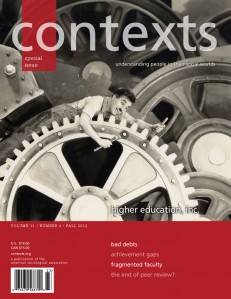
Fall 2012
Volume: 11 | Number: 4
Mind Which Gap?
Since the early nineteenth century, social reformers have been concerned with how different groups fare in school. In the early … Read More
Anti-Social Debts
The current student debt burden is an unsustainable outcome of the government's abdication of responsibility to secure access to higher education. Andrew Ross analyses the factors behind the funding crisis and suggests some ways to reestablish an affordable education system. Read More
The Not-So-Pink Ivory Tower
Sociologist Ann Mullen explores what it means that women now earn the majority of bachelor’s degrees. Rather than seeing this as a sign of a “male crisis” in higher education, this article concludes that the gender integration of higher education is far from complete. Read More
Teaching to Distraction
The classroom is a social space, and how students experience and perceive that space shapes how they approach their classrooms and what they do in them. Margaret Austin Smith uses ethnographic data of college students' classroom experiences to demonstrate the degree of importance understanding students' ways of knowing the classroom has on the effectiveness of teaching and learning relationships. Read More
Keeping Rank
Sociologist Dana M. Britton examines barriers to advancement in the academy, focusing on long-term associate professors. In particular, she draws attention to the role of "institutional reproduction"—teaching, advising, and service—as a barrier to advancement. Read More
College Sports’ Corporate Arena
Sociologist D. Randall Smith argues that a segment of big-time college sports has embraced the corporate model and this has led to a steady increase in the revenue gap between the "haves" and "have nots." Read More
The Chattering Class
Sociologist Michael Schudson reviews Ronald Jacobs and Eleanor Townsley’s The Space of Opinion. He argues that this full-length study of opinion journalism in the United States makes a strong case that the mix of diverse opinions, formats, and personalities in our era of op-ed pages, talk radio, and cable TV helps engage citizens with politics and improves democratic deliberation. Read More
Religious Origins
Eduardo Mendieta reviews the book Religion in Human Evolution. He reflects on Robert Bellah's massive book on the role of religion in human evolution up to the Axial Period, and the emergence of second order cognitive and moral reflexivity. Read More
Breakthrough Books: Education
Scholars sound off about the books that shaped how we think about education. Read More
Passing on Faculty Roles, Cui Bono?
Sociologist Helen Moore discusses how capitalization of academic faculty roles raises questions of whether or not we have adequate theories to assess such changes. She argues that labor market fragmentation, racialization, and gendered faculty roles provide new frameworks for these theories. Read More
